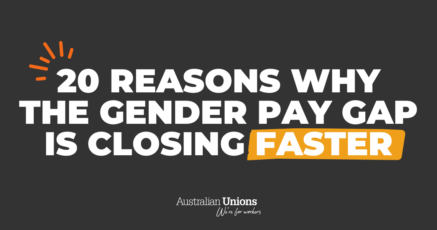The crucial educational, social and economic role of early childhood education and care (ECEC) has been further highlighted over the past two years, as the interruptions of lockdowns and distancing have exacerbated longstanding barriers to accessing free, high-quality, ECEC in Australia.
As the Thrive by Five campaign highlights, providing universal access to free, high-quality ECEC, delivered by properly-paid, highly-skilled and securely employed educators is one of the most significant and urgent reforms of our time. Universal access to high quality ECEC is the starting point of equal opportunity for all Australians. Addressing women’s workforce participation would contribute $70 billion per year in GDP. Free, universal early childhood education and care would pay for itself in higher tax revenues generated by women’s increased participation. As the National Cabinet plan for transitioning to a vaccinated economy progresses, now is the time to recognise the crucial role of ECEC in the educational outcomes of our children, the productivity of our national economy, and in bringing a liveable balance back to the lives of working parents.
The government has shown it has no plan to deliver free, quality ECEC to all Australians. This week, Alan Tudge announced that additional subsidies for ECEC planned for July 2022’s budget will now start from March, meaning that families with two or more children attending ECEC will have from 30% to 95% of their younger children’s fees subsidised. While the subsidies will benefit a small number of parents, they fall well short of the need for free, high-quality, and universal ECEC. Nor do they address problems of safety and quality or pay and conditions for overworked staff. The result is undervalued staff leaving the sector, children denied the best start in life and parents – typically women – forced to put their careers on hold due to unaffordable ECEC.
This month, the United Workers Union released a report documenting the failings of for-profit ECEC in Australia, entitled Unsafe and non-compliant: Profits above safety in Australia’s early learning sector. This report highlights the overwhelmingly high rates of non-compliance with safety standards at for-profit ECEC centres, and the lack of transparency measures around safety and compliance which mean that parents and carers are often kept in the dark about these failings. The report documents systemic understaffing issues, limited resourcing for workers, and risks posed by cost-cutting measures designed to maximise profits. These failings in the for-profit ECEC sector mirror recent findings in the disability support and aged care sectors, where for-profit providers have lower safety standards.
The Morrison Government’s approach to subsidising, rather than fully funding, ECEC means that the profits of the private sector continue to grow, while costs to parents and carers are only temporarily alleviated. Meanwhile, out-of-pocket costs for ECEC in Australia are among the highest in the OECD. As the report notes, “the current system of putting profits first has failed; we need to build a new system that puts children and educators back at its centre.” The situation calls for full public funding for ECEC, in conjunction with transparency in how private providers spend the funding, and caps on what they can charge parents or carers.
Work predominantly performed by women – such as early childhood education and care – is lower-paid and less secure because of gendered assumptions and discriminatory views about the value and complexity of the work. This essential and skilled work must be properly valued by governments and employers.The government’s response is wholly inadequate. It fails to properly value educators or to address systemic issues of quality and access, and it fails to value ECEC as an essential piece of social infrastructure.
As outlined in the ACTU’s National Jobs Plan, the government must urgently commit to significant long-term investment to build and expand our ECEC system as a high- quality, universally accessible, and publicly funded service, rather than doubling down on a subsidy system which has been demonstrated to benefit the unscrupulous for-profit sector. This approach, however, would require an acknowledgement that ECEC is a fundamental necessity for meeting children’s social and educational needs, boosting our national economy, and supporting parents and families in their working lives and beyond.






SHARE:
Early Childhood Education and Care isn’t just an “incentive”: it’s essential national infrastructure